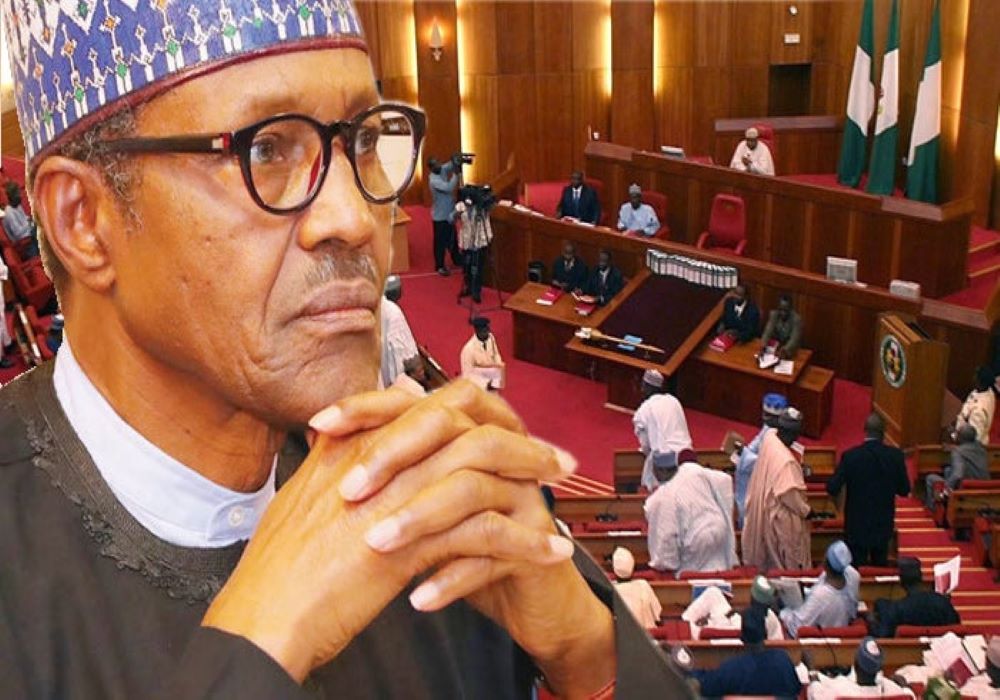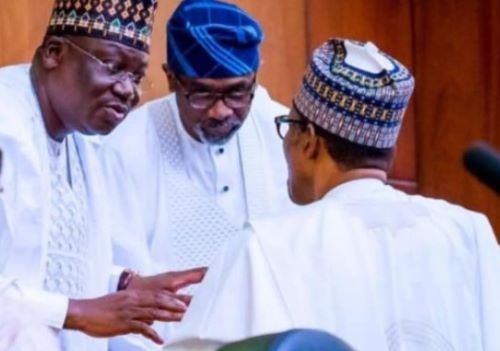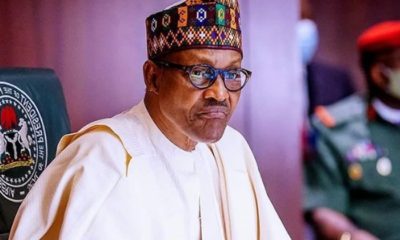Finance
Buhari to borrow N8.80 trillion to finance budget deficit of N10.78tr

By John Danjuma
President Muhammadu Buhari on Friday laid N20.51 trillion 2023 budget before the National Assembly with deficit of N10.78tr
He indicated that the budget, which was raised from N19.76 trillion, is a reflection of the serious challenges currently facing Nigeria.
According to President Buhari, the budget comes with N10.78 trillion deficit, and the Nigerian government would need to borrow a total of.
Read also>>>Lawan proffers solutions to budget deficit as Buhari presents 2023 Appropriation Bill
The breakdown of the budget shows that new borrowings of N206.18 billion would come from Privatization Proceeds, while N1.77 trillion would be obtained from bilateral/multilateral creditors, which would be for specific development projects or programmes.
According to him the budget deficit of N10.78 trillion is 4.78 per cent of estimated gross domestic product (GDP). This is above the three per cent threshold set by the Fiscal Responsibility Act 2007.
What to expect next year with Nigeria’s 2023 budget?
Speculation by analysts indicated total expenditure for the Federal Government would gulp a whopping sum of N20.51 trillion in 2023. Buhari disclosed that the expenditure includes N2.42 trillion spending by Government-Owned Enterprises.
The significant expenditure surpasses the N16.87 trillion revenue he projected for 2023.
Other breakdown of the budget shows that the oil price benchmark should be at least $70 per barrel in 2023, even though the oil price is currently $89.31.
Buhari intimsted the lawmakers that Nigeria will produce daily oil production estimate of 1.69 million barrels (inclusive of Condensates of 300,000 to 400,000 barrels per day).
This is below the 1.830 million barrels per day quota currently set for Nigeria by the Organisation of Petroleum Exporting Countries plus (OPEC).
According to Buhari, the foreign exchange rate between naira and the US dollar is expected to trade at a range of N435.57/$1. Prime Business Africa understands this means the naira will devalue next year.
Based on the current exchange rate as at Thursday, October 6, 2022, which is N437.5/$1, the naira will depreciate by -0.44 per cent in 2023, losing around N1.93 in value. ,
Buhari’s administration projected GDP growth rate of 3.75 per cent despite the economic challenges driven by the war between Russia and which has continued disrupting global economies,
He projected inflation to climb down from the current 20.52 per cent to 17.16 per cent inflation rate in 2023, when his administration will wind down, with a new government coming in.
Buhari ialso nducated that, “The expenditure policy of Government in 2023 is designed to achieve the strategic objectives of the National Development Plan 2021 to 2025, including macroeconomic stability.
According to him, it also included human development; food security; improved business environment; energy sufficiency; improving transport infrastructure; and promoting industrialization focusing on Small and Medium Scale Enterprises.
“Against the backdrop of the challenging global and domestic economic environment, it is imperative that we strengthen our macroeconomic environment and address subsisting challenges as a country. The 2023 Appropriation therefore is a Budget of Fiscal Sustainability and Transition. Our principal objective in 2023 is to maintain fiscal viability and ensure smooth transition to the incoming Administration.”
Business
Nigeria pays US$4.9 billion on petrol subsidy in 2024- NNPCL
It was however noted by Biztellers.com.ng, that although subsidy is back in effect, the main reason for that is the increasingly weak state of the Naira and the country’s extreme dependence on products importation. Also unlike the previous subsidy era, where several oil marketers were getting free subsidy refunds for unverified product importation, this subsidy era is witnessing only one importer, the NNPCL, which in effect is the sole receiver of government subsidies.
Yemie ADEOYE
INSPITE of the official position of the Nigerian government that the controversial petrol subsidy is gone for good as announced by the President on assumption of office, the state owned Nigerian National Petroleum Corporation Limited, NNPCL has disclosed that petrol subsidy is still fully operational in Nigeria, although, under a different identity.
Umar Ajiya, Chief Financial Officer at the NNPCL, disclosed that it cost the company a staggering N7.8 trillion (US$4.9) to cover this price gap in the first seven months of 2024.
Rather than simply referring to these claims as subsidies, he stated that the company is merely managing the price difference in petrol imports on behalf of the federation, stressing that this should not be misconstrued as a return to subsidy payments.
![]() This revelation has reignited discussions on whether the NNPC is indirectly offering subsidies, a concept typically defined as selling a product below its cost price.
This revelation has reignited discussions on whether the NNPC is indirectly offering subsidies, a concept typically defined as selling a product below its cost price.
Documents reviewed by Biztellers.com.ng showed that the term “subsidy” was used extensively in official correspondence between the NNPCL and the presidency, particularly in reference to the “shortfall.”
Recall that President Bola Tinubu reportedly approved NNPC’s request to utilize the 2023 final dividends due to the federation to offset these costs.
However, during a media briefing on Monday about the company’s 2023 audited financial statements, Ajiya refuted claims that the NNPC is involved in any subsidy scheme.
Ajiya further disclosed that the Nigerian government owes the NNPC N7.8 trillion ($4.9 billion) in subsidy-related debts for the period from January to July 2024.
In furtherance of his clarification to the News Agency of Nigeria (NAN), Ajiya insisted that no subsidy payments have been made to any marketer in the last nine years, citing the NNPC’s role as the sole importer of petrol under supply contracts.
He said, “In the last eight to nine years, NNPC Ltd. has not paid anyone a dime as a subsidy; no kobo has been disbursed by NNPC Ltd. in the name of subsidy. No marketer has received any payment from us for subsidy.”
“What has been happening is that we have been importing PMS, which has been landing at a specific cost price, and the government tells us to sell it at half price. So the difference between the landing price and that half price is a shortfall.
“And the deal is between the Federation and NNPC Ltd., to reconcile, sometimes they give us money, so there is no money exchanging hands with any marketer in the name of subsidy.”
Ajiya remained silent on how much of the $4.9 billion could have been remitted to the federation account if the NNPC had not been covering the “shortfall.”
It was however noted by Biztellers.com.ng, that although subsidy is back in effect, the main reason for that is the increasingly weak state of the Naira and the country’s extreme dependence on products importation. Also unlike the previous subsidy era, where several oil marketers were getting free subsidy refunds for unverified product importation, this subsidy era is witnessing only one importer, the NNPCL, which in effect is the sole receiver of government subsidies.
Banking
CBN Denies Currency Devaluation

The Central Bank of Nigeria (CBN) has refuted claims of devaluing the.
Earlier reports suggested that the CBN had devalued the Naira, lowering its exchange rate from N631 to the dollar, compared to the previous day’s rate of N461.60 at the Importers and Exporters (I&E) window.
However, the Central Bank of Nigeria (CBN) released a statement on Thursday through its Acting Head of Corporate Communications, Dr. Isa Abdulmumin, categorizing the report as false information.
In the statement titled ‘CBN Has Not Devalued The Naira’, he said the attention of the apex bank was drawn to the news report by an Abuja based newspaper edition of June 1, 2023, titled “CB Devalues Naira To 630/51”.
However, the CBN stated categorically that the news report was replete with outright FALSEHOODS and destabilizing innuendos, ‘reflecting potentially willful ignorance of the said medium as to the workings of the Nigerian Foreign Exchange Market.’
“For the avoidance of doubt, the exchange rate at the Investors’ & Exporters (I&E) window traded this morning (June 1, 2023) at N465/USS1 and has been stable around this rate for a while.
“The public is hereby advised to ignore the news report by Daily Trust in its entirety, as it is speculative and calculated at causing panic in the market,” the CBN spokesman added.
He, therefore, advised media practitioners to verify their facts from the Central Bank of Nigeria before publishing in order not to misinform the public.
Banking
BREAKING: CBN Increases Interest Rate By 0.5%

The interest rate in Nigeria has been raised to 18.5 percent, up by 0.5 percent, from 18 percent where it was pegged in March 2023.
The Central Banks of Nigeria’s (CBN) Monetary Policy Committee (MPC) resolved to this effect at its third meeting of 2023 in Abuja, on Wednesday.
Governor, CBN, Godwin Emefiele, made the disclosure in the communiqué of the MPC’s meeting, thereafter.
While engaging the media at the end of the two-day meeting, Emefiele, said the committee voted to keep the asymmetric corridor at +100 and -700 basis points around the MPR.
In the view of the MPC, rising inflation rate is traceable to the high energy cost and challenges around the supply chain, among others, which lie outside the corridors of the CBN.
Emefiele said, “The current trend in price development would continue to be monitored by the bank with greater collaboration with fiscal authority to address the drivers of inflation.”
Biztellers reports that the CBN had effected six consecutive interest rate increases, which has seen the rate move from 11.5 percent in March 2022 to 18.5 percent in May 2023.



















